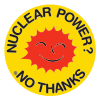Nuclear Information and Resource Service
 | |
| Formation | 1978 |
|---|---|
| Headquarters | Takoma Park, MD, |
Exec. Dir. | Tim Judson |
| Website | http://www.nirs.org |
The Nuclear Information and Resource Service (NIRS) is a 501(c)(3) non-profit anti-nuclear group founded in 1978 to be the information and networking center for citizens and organizations concerned about nuclear power, radioactive waste, radiation and sustainable energy issues. The organization advocates the implementation of safe, sustainable solutions such as energy efficiency, solar power, wind power and plug-in hybrids.
In 2000, NIRS' affiliation with World Information Service on Energy (WISE) turned it into an international organization (NIRS/WISE).[1]
The magazine Nuclear Engineering International has said that it runs easily the best website on uranium mining throughout the world.[2]
| Anti-nuclear movement |
|---|
 |
| By country |
|
| Lists |
Issue stances[]
This section is empty. You can help by . (May 2020) |
International offices[]
NIRS and WISE have merged their operations and WISE has relay offices in Amsterdam, Argentina, Austria, the Czech Republic, India, Japan, Russia, Slovakia, South Africa, Sweden, and the Ukraine.[3] The bi-weekly WISE News Communique merged with the NIRS Nuclear Monitor and covers the resistance movements working against nuclear power worldwide as well as chronicling the failings of the industry. Spanish, Russian and Ukrainian versions of this newsletter are also printed.
Michael Mariotte (1952-2016) was president and executive director of the Nuclear Information and Resource Service for 30 years. He was a well-known opponent of nuclear power and organized anti-nuclear activities in Europe after the 1986 Chernobyl disaster. Mariotte was a keen supporter of renewable energy and efficient energy use. He believed that nuclear power would become obsolete, to be replaced by clean energy sources.[4]
Press[]
On 15 May 2007, NIRS issued a report claiming that radioactive scrap, concrete, equipment, asphalt, plastic, wood, chemicals, and soil from U.S. nuclear weapons facilities are being released to regular landfills and could get into commercial recycling streams."[5]
On 3 August 2004, NIRS issued a report stating that the U.S. Nuclear Regulatory Commission may allow the illegal practice of manually shutting down nuclear power plants in the event of fire.[6]
On 17 July 2007, regarding the leakage of water from the spent fuel pool of the Kashiwazaki-Kariwa Nuclear Power Plant after the 2007 Niigata earthquake, Michael Mariotte, spoke on behalf of the NIRS and commented "The leak itself doesn't sound significant as of yet, but the fact that it went unreported is a concern, when a company begins by denying a problem, it makes you wonder if there's another shoe to drop."[7]
In October 2010, Michael Mariotte, executive director of NIRS, predicted that the U.S. nuclear industry will not experience a nuclear renaissance, for the simple reason that “nuclear reactors make no economic sense”. The economic slump has driven down electricity demand and the price of competing energy sources, and Congress has failed to pass climate change legislation, making nuclear economics very difficult.[8]
Famous supporters[]
NIRS counts the following celebrities among its supporters:[1]
Controversy[]
Critics accuse NIRS of fearmongering and question the qualifications of NIRS staff to adequately assess the safety of nuclear energy. No NIRS staff member is credited with formal training in nuclear physics or engineering.[9]
In a 2008 response to NIRS claims appearing on the website palmbeachpost.com,[10] David Bradish of the Nuclear Energy Institute challenged a contention of NIRS Southeast Office Director Mary Olson that "A nuclear power plant takes so much water and energy to build, it has to run for 15 years to offset its carbon footprint." Citing data from the World Nuclear Association, Bradish argues "it is reasonable to say a nuclear plant takes about one year to offset its energy consumption from its other stages." At a 2006 talk before the United Nations Commission on Sustainable Development, Olson claimed that when full-lifecycle emissions are included "the release of carbon dioxide (CO2) as the result of making electricity from uranium is comparable to burning natural gas to make electric power."[11] Bradish notes, "I went to both of the cited studies [referenced by Olson] and found nothing to back up NIRS' claim."[12]
See also[]
- Anti-nuclear movement in the United States
- List of anti-nuclear protests in the United States
- Nuclear renaissance in the United States
- Paul Gunter
- Paxus Calta
- WISE-Paris
References[]
- ^ a b About NIRS
- ^ Nuclear Engineering International. Public opinion: how do we get it on our side?. 21 January 2008.
- ^ "Imagine a world without nuclear power... | Wise International".
- ^ Sam Roberts, Michael Mariotte, a Leading anti-nuclear activist, dies at 63 New York Times, May 23, 2016.
- ^ U.S. Allows Radioactive Materials in Ordinary Landfills
- ^ Manual Shutdown of U.S. Reactors on Fire May Be Allowed
- ^ "Japan Quake Kills At Least 9; Nuclear Plant Damaged". Archived from the original on 2011-09-27. Retrieved 2008-01-24.
- ^ Matthew L. Wald. Sluggish Economy Curtails Prospects for Building Nuclear Reactors, The New York Times, October 10, 2010.
- ^ "NIRS - Staff" Retrieved on 7 May 2017.
- ^ http://www.palmbeachpost.com/search/content/north/epaper/2008/03/30/s3c_summit_0330.html
- ^ Olson, Mary. "Confronting a False Myth of Nuclear Power: Nuclear Power Expansion is Not a Remedy for Climate Change" Retrieved on 7 May 2017.
- ^ Bradish, David. "Energy Payback Times for Nuclear" Retrieved on 7 May 2017.
External links[]
- Nuclear Information and Resource Service (NIRS)
- World Information Service on Energy (WISE)
- Beyond Nuclear
- "The world's worst nuclear power disasters". Power Technology. 7 October 2013.
- Anti–nuclear power movement
- Anti-nuclear organizations based in the United States
- Nuclear weapons policy
- Nuclear safety and security
- Climate change organizations based in the United States
- Renewable energy organizations based in the United States
- Sustainability organizations
- Political advocacy groups in the United States
- Organizations established in 1978
- 1978 establishments in the United States